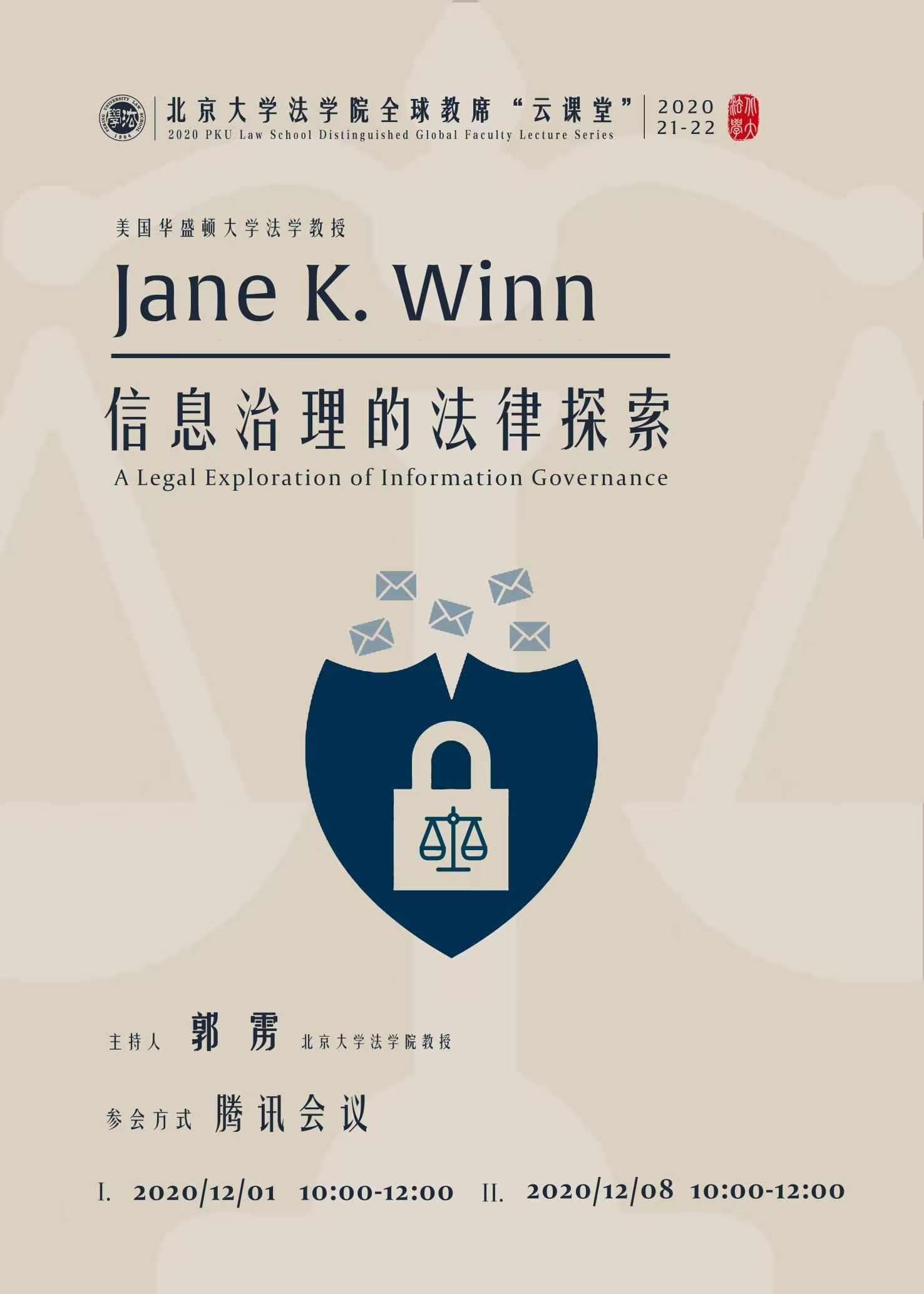全球教席“云课堂”21-22讲
21讲
题目:信息隐私保护的全球监管竞赛:欧美比较(Information Privacy Global Regulatory Competition: Comparing Europe’s Fundamental Rights Approach with America’s Pragmatic Approach)
时间:2020年12月1日(周二)10:00-12:00
腾讯会议 ID:789 437 826
22 讲
题目:中国的信息隐私法律与”一带一路“建设(Can China Harness Information Privacy Law to Serve Belt and Road?)
时间:2020年12月8日(周二)10:00-12:00
腾讯会议 ID:473 238 430
开讲学者:
Jane K. Winn(美国华盛顿大学法学教授)
主持人:
郭雳(3354cc金沙集团教授)
评议人:
21讲:
杨明(3354cc金沙集团副教授)
边仁君(3354cc金沙集团博士后研究人员)
22讲:
陈一峰(3354cc金沙集团副教授)
廖雪霞(3354cc金沙集团博士后研究人员)
开讲学者简介:

Jane K. Winn 教授的主要研究领域为比较法和商法,重点研究全球化的影响以及国家法治体系改革。她毕业于伦敦玛丽女王大学和哈佛大学3354cc金沙集团,是美国法律协会成员,其关于中国台湾地区法律的研究曾两次荣获富布赖特项目资助。她先后在加州大学伯克利分校、3354cc金沙集团、清华大学、浙江大学、台湾地区清华大学、香港大学、泰国朱拉隆功大学、印度大学国立3354cc金沙集团、巴黎政治大学、法国里昂第三大学、澳大利亚莫纳什大学及墨尔本大学3354cc金沙集团等院校客座授课。她的著作包括《新世纪的买卖法》《买卖与合同的法律协议》等。Winn 教授目前致力于研究美国、英国、欧盟、中国和印度是如何运用规制促进支付系统的竞争和创新,以及通过机器实施知识管理系统的兴起对现代法律体系的影响等相关问题。
Jane K. Winn is the Professor of University of Washington, Seattle, Washington and specializes in comparative and commercial law, focusing on the impact of globalization and innovation on national legal systems. A graduate of Queen Mary College, University of London and Harvard Law School, she is a member of the American Law Institute and has twice received Fulbright grants for research in Taiwan Province of China. She has visited University of California-Berkeley, Peking University, Tsinghua University, Zhejiang University, National Tsinghua University, University of Hong Kong, Chulalongkorn University, National Law University-Odisha, Sciences Po, UJM-Lyon III, Monash University as well as Melbourne Law School. Her publications include Sales Law for a New Century and Sales and Contract Law Agreements Supplement. Her current research focuses on the use of regulation to increase competition and innovation in payment systems in the US, UK, European Union, China and India, and on how the rise of machine-mediated knowledge governance systems will transform modern legal systems.
讲座摘要:
信息隐私保护的全球监管竞赛:欧美比较
信息隐私保护法构成了新兴的全球知识经济的基石之一。在欧洲国家所采取的基本权利路径与美国的实用主义路径之间的监管竞争中,许多观察者倾向于认为,欧洲的路径将取得胜利。然而越来越多的证据表明,欧盟实施的《通用数据保护条例》以及欧洲法院做出的 Schrems I 和 Schrems II 判决,正在削弱欧洲的全球信息市场竞争力。Facebook-Cambridge Analytica 丑闻之后,在美国爆发的政治争议导致加利福尼亚州实行了欧盟式的法律改革,但美国其它司法管辖区则拒绝效仿欧洲。如果美国人能够找到一种方式来重塑其监管信息隐私领域的实用主义路径,那么美国保持其在全球信息经济中领导地位的几率将会提升。
Information Privacy Global Regulatory Competition: Comparing Europe’s Fundamental Rights Approach with America’s Pragmatic Approach
Information privacy law forms part of the foundation of the emerging global knowledge economy. In the regulatory competition between Europe’s fundamental rights approach and America’s Pragmatic approach, many observers appear convinced that that the victory of the European approach is inevitable. But evidence is growing that the EU’s General Data Protection Regulation together the European Court of Justice’s Schrems I and Schrems II decisions are crippling Europe’s efforts to compete in global information markets. The political controversy that exploded in America in the wake of the Facebook-Cambridge Analytica scandal led to EU-style law reform in California but other American jurisdictions have resisted the temptation to copy Europe. If American can find a way to reinvent its Pragmatic approach to information privacy, then the odds it will retain its leadership of the global information economy will improve.
中国的信息隐私法律与“一带一路”建设
近年来,中国的信息隐私法律框架逐渐形成。与此同时,中国为塑造全球经济发展的未来绘制了政策蓝图,包括“一带一路”“数字丝绸之路”“中国制造2025”,以及下一代AI开发和社会信用体系建设等。整体而言,美国在信息隐私领域的实用主义做法似乎与中国引领新兴全球信息架构建设的雄心相契合,而欧洲采取的基本权利路径则与之相悖。当然,为确保其相关大胆政策举措的成功,中国可能需要通过新的知识治理框架来超越欧美关于信息隐私法的有限讨论。
Can China Harness Information Privacy Law to Serve Belt and Road?
In recent years, a legal framework for information privacy law has slowly been emerging in China. This effort has been overshadowed by China’s bolder efforts to shape the future of global economic development with policy initiatives including Belt and Road, Digital Silk Road, Made in China 2025, Next Generation AI Development, and Social Credit System Development. The American Pragmatic approach to information privacy generally appears compatible with China’s ambitions to help lead the design of the emerging global information architecture, while the European fundamental rights approach generally appears antithetical to it. To insure the success of its other bold policy initiatives, however, China may need to transcend the restricted scope of the European-American debate over information privacy law with a new knowledge governance framework.

对外事务办公室
2020年11月27日
